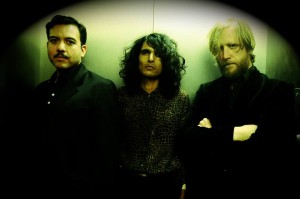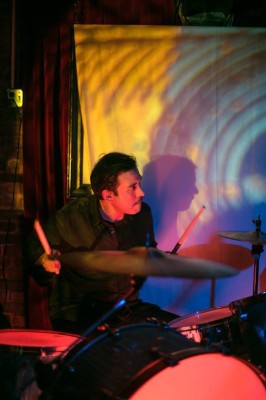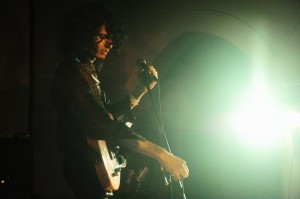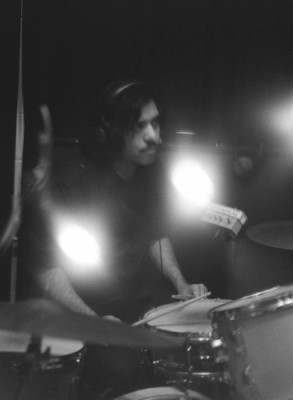TWO INDIE ROCKERS GET TRAPPED IN AN ELEVATOR.
What sounds like the first half of a hipster musician joke is in fact the real-life origin of the psychedelic groove crew, EFG, whose seeds were serendipitously sewn in a broken-down lift in London’s BBC Studios several years back. The two musicians—Yeah Yeah Yeahs guitarist Imaad Wasif and Secret Machines drummer Josh Garza—had arrived at the Beeb to film separate segments for Top of the Pops with their respective bands until the sputter and abrupt halt of their elevator waylaid their commute. As technicians assessed the situation, panic ceded to boredom, which, given their avocations, inevitably led to jamming, and a band was born. Only the two could not see it at the time.
Three years transpired before Wasif and Garza reconnected eight time zones away on the sun-baked boulevards of Los Angeles, this time the men promptly repaired to Wasif’s nearby studio where their second jam session yielded a roughly-hewn demo of “Circles,” a shimmery pastiche of psychedelic pop that would sit as the centerpiece of their eponymous debut EP in 2011.
The ensuing years saw the duo release a follow-up EP and play a string of captivating live dates that featured the two not so much playing songs from their albums as using those ideas as starting points for propulsive grooving crafted around expansive loops, Wasif’s blistering fretwork and Garza’s rhythmic ostinato, each jam gathering into its own breathtaking climax.
Recently, EFG added bassist and studio veteran Tom Biller (Kanye West, Fiona Apple, Rhett Miller, Karen O) to the roster and completed a dynamic new clutch of pop-infused psychedelia, underpinned by chunky slabs of good old-fashioned 70s garage rock. Whereas their previous outings showcased raw experimentalism, the new album features tighter song structures, sturdier hooks and subtle melodic textures that connect the fabric of each track in such a way that the material demands to be considered as a whole, rather than as singles. As the band puts the finishing touches on the new album and begins plotting summer tour dates, we sat down with Josh Garza to discuss the new material and to find out just how much of that elevator story really happened.
The elevator story- is it true?
Yeah, we met in England at the BBC Studios. He was touring with the Yeah Yeah Yeahs and I was with Secret Machines. It’s weird that you do something like that and it’s just a story that’s interesting and cool, but it only becomes a big deal when it’s a few years later and you’ve started a band together and then you look back and think, Man, that was crazy… I remember when it happened and at the time it wasn’t a big deal. I was probably thinking that [Imaad] was just some random dude that I met, and he was probably thinking that I was just some random dude in Secret Machines. The cosmos gives us these little moments that might just mean something later on down the road. Sometimes it’s just a moment in time and nothing ever comes of it, but other times it’s like a little treat from the cosmos.

Is it safe to say then, that when you both stepped out of that elevator, neither of you considered collaborating together?
Not at all. If anything, it was like, “Alright dude, check you later…” Nowadays you can’t meet anybody without getting an email, phone number, web site, or something like that, but then there was no “Hey man, give me your email.” Obviously that’s been going on since the late 90s but when I met Imaad, that just wasn’t something I did. When you’re on the road on tour in Europe, you run into so many people and out of the thousands of people that I run into, there are probably five hundred other bitchin’ stories about those people. (laughing)
Three years later, you two reconnected in Los Angeles. Were you looking for something outside of Secret Machines at that time? What made that meeting “right” for the collaboration, as opposed to the first time?
I had just moved to L.A. and I knew that at that time, Brandon (Curtis, vocalist/bassist of Secret Machines), had just started working with Interpol, so right when he told me that I knew that it would take up the next year and a half, if not the next two years of his time. So I was in L.A. and I was kind of looking for people to jam with but nothing really clicked. Then I remember that I went to a mutual friend’s birthday at a bar and I remember seeing Imaad and thinking, Hey, there’s that dude from the elevator! For me, as a drummer who’s itching to play, I reconnect with a guitarist that I haven’t seen in awhile and within sixty seconds of seeing him, I was launching into, “Hey man, what are you up to? Do you have a band? Let’s jam.” I don’t know how most drummers are, but I was really hoping to find somebody to jam with who could bring something to the table. I didn’t want to jam with just anybody. That’s not as much fun as jamming with people that are really talented and on the same page. So we really got lucky.
 When you say “on the same page,” what do you mean? What’s a good fit for your style of drumming?
When you say “on the same page,” what do you mean? What’s a good fit for your style of drumming?
It’s funny because drummers are usually the weirdest part of the band, because on one hand, everybody will tell you, “You’re only as good as your drummer,” or “You need to have a good drummer.” The truth of the matter though is that most people don’t want a really good drummer. Most people want you to just shut the fuck up, stay out of the way and just play the beat, so it takes a certain kind of chemistry in a band for me to feel like there’s something for me to do, because I have strong opinions about not just tempos and beats, but song structures, the length of songs and stuff like that. There are a lot of songwriters who will say, “Don’t tell me how to write a song. Let me write the song and you just play the beat.” Those are people I can’t work with, unless of course you’re paying me to be a session guy, and then I’m, “Alright, whatever you want. Can I have that in cash? Bye.”
Admittedly it’s usually the other instruments that create the melodies and hooks that stand out in a piece of music, so how do you assert your creative voice?
In terms of being able to express myself in a band, I want to bring something to the table that will compliment certain types of singer/songwriters and guitarists. Like Imaad obviously can come to the table with a song that’s fully-cooked and ready to go, but then it’s not really a collaboration. It’s not a band, it’s a solo project. I need to get my hands involved. Let me in the kitchen and let me get into the cooking. I don’t get attached to lyrics or tempos or what the song sounds like; I tune in to what the song wants and I like to throw that opinion out there. I’m not always right, but the best thing about ideas is that they’ll always lead to another. Not all bands are like that. There are a lot of cookie cutter bands that are fixed on the idea of three and a half-minute songs full of verse, chorus, verse, chorus, middle eight, out. I don’t mean to dis that because every band should do what they need to do, but Imaad and I are trying to explore the more expressive side of music. What are we trying to say? What’s the vibe? Sometimes we have to go off a little bit to find out what that is, but other songs we don’t- we’ve got some that are just three minute rockers. That’s what’s exciting about this project- we’ve got a lot of territory to explore.
While you have explored a wide range of styles without particular allegiance to any one or two, at the same time you have said in the past that the purpose of EFG is to transmit a visceral experience to listeners, particularly in your live show. How do you accomplish that, sonically?
We start with figuring out what sort of experience we want to have. If we’re in a rehearsal space, we’re not thinking about what we’re going to make other people feel, we’re asking ourselves what we want to experience once the song is there. If we can’t inspire each other, then we’re just going through the motions and we’re not going to inspire anybody, so we start by focusing on what excites us. Sonically, some bands say, “We’re a blues act,” or “We wanna be a dance act.” Everybody can pick and choose, but sometimes art isn’t about picking and choosing what you want to do, sometimes art is about expressing what it is that you’re feeling. You don’t really say, “I wanna be a space rock band,” usually it’s something that you gravitate towards organically and that’s what you’re able to express really well.
Where will we hear the differences between the new album and the previous outings?
When you hear this album, I hope that you feel the storyline. It may not be linear—this isn’t a conceptual album—but there’s a beginning, a middle part, a big ending… We had to look and see if we could do this without seeming pompous, or self-conscious and at the same time listenable. But it rocks and I hope that people hear that. Unfortunately people don’t listen to albums anymore, but if they did I think they’d love this one because you can put it on and come out the other side thinking, Man, that was a cool trip that I just went on. This isn’t a one-trick pony—the songs can rock, they can be mellow, they can be long or short. We’re just trying to express things that we like in the context of the band, using things that we’re good at.

You’ve got a bass player now.
Yeah, I feel like we’re evolving. I think we’re more of a band now. I think that before Tom joined, we were a lot more experimental because there wasn’t a bassist. We used more loops and I was playing to that because Imaad wanted to do a lot of live things that would require more guitarists, so instead he would just sample and make a loop and play on top of that. I’d play to the loop, and then I’d play to him and it was this cool thing, but at some point we realized that it wasn’t something that we really enjoyed doing. It was difficult to do in a rock setting without getting stale, and it’s not fun to play to a loop. It wasn’t just me, either—Imaad was like, “I don’t like making loops” and I was like, “Well, it ain’t fun for me, either!” (laughing) So it was a good challenge for us. We were both open-minded enough to try it and we did it, but we eventually realized that it wasn’t our cup of tea. Ultimately it wasn’t really our thing and we realized that if we had a bassist, we could relax a little more and focus on our live playing.
Your live show is a radical departure from the studio output and it’s certainly what has cemented your buzzworthy reputation around L.A.- no small feat in a city teeming with thousands of bands of every style imaginable. What’s your strategy when you take the stage?
To me, it’s the easiest thing to do. But let’s not talk about the obvious things—that it takes practice, and it takes some dedication, etc. For us, we have to use rehearsal not as a form of practice for a recital, which is what a lot of bands do; they rehearse a song so they can play a song live, the way that they rehearsed it. We rehearse so that we can take it somewhere else live. It’s like how in sports, you don’t practice a specific play because the other team isn’t going to necessarily let you do that. You practice so that when they try to stop you, you know what to do. Playing live is the same thing—you’re taking it to this weird level so that when you get on stage, if the sound sucks, or the monitors break or it’s too loud or not loud enough, or if Imaad breaks a string, it’s all taken in stride and that’s what let’s you really go for it. It’s about developing that intuition and awareness so you can push the envelope in terms of the dynamics, speed it up, slow it down, whatever. We never play a song the same way twice, and that’s a good thing. That’s rock and roll—you can’t really think of it too much. You have to just go for it and fly by the seat of your pants and that doesn’t happen overnight.
 This is always such an unfair question to ask a musician, which is precisely why I’m going to ask you- do you have a favorite track on the new album?
This is always such an unfair question to ask a musician, which is precisely why I’m going to ask you- do you have a favorite track on the new album?
There are a lot of those moments for me on this album, for a load of different reasons. I feel like on “Ism Schism Godless Man,” we actually caught that moment I was talking about just now. There’s just a vibe there. But the one that really impressed me was that song “P.I.G.” or even the first song, “Beware,” we really recorded them in a way that made the material even more interesting. We found a little more room for the songs to grow so when we started mixing, we added some overdubs and then we realized that we had taken the songs to places where they could not have gone otherwise. In a live setting, there’s only so much you can do with three dudes. “Singing Bridges” was actually the hardest song for us. We kept going around and around, in terms of the mixing part and at some point we realized that the song couldn’t be what we wanted it to be—it didn’t sound like it fit with the rest of the record or what we thought we wanted it to sound like. Ultimately the song itself had to do its own thing.
What’s the plan from here?
We’ve got some labels and management interested in releasing the new album, but we’re taking our time. If we were twenty-two years old, we would have already released this record on the Internet and been touring Lawrence, Kansas in one van and sleeping on floors. But when you get older, you stop and say, “Wait a minute, we don’t have to hurry up and do it wrong.” We can take our time and do it right and make sure this sees the light of day and that it’s not released in a vacuum. We don’t want to self-release this one just for the sake of releasing it, we want the right people to hear it and we want people who like rock and roll to hear it. There are thousands and thousands of bands that feel the same way we do, so we’re going to play some shows, build up some more momentum, get this released and see what happens from there.


